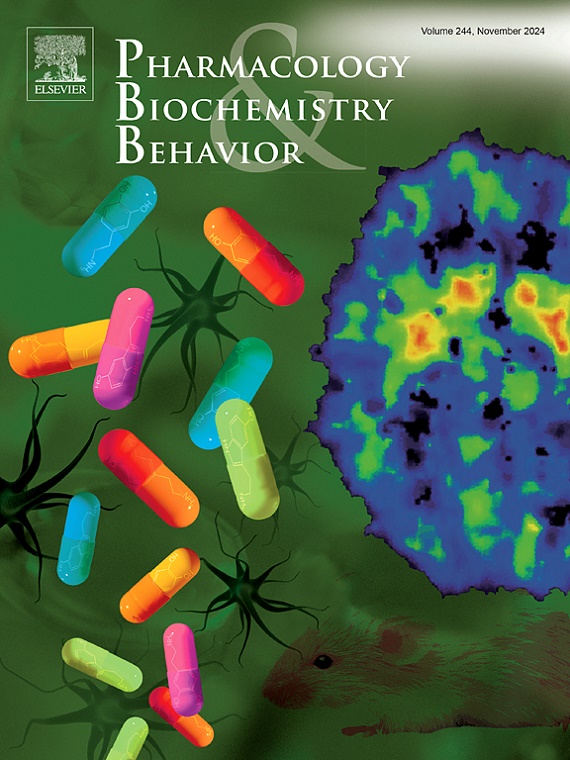Melanin-concentrating hormone: A promising target for antidepressant treatment
IF 3.3
3区 心理学
Q1 BEHAVIORAL SCIENCES
引用次数: 0
Abstract
Depression represents a complex neuropsychiatric disorder with an escalating global health burden, characterized by heterogeneous pathophysiology and profound impairments in cognitive-emotional functioning. Current treatment methods have limited efficacy in some individuals and may induce undesirable side effects, necessitating the exploration of novel therapeutic targets and techniques. Emerging research has identified neuropeptide systems as pivotal regulators of mood-related circuits, with melanin-concentrating hormone (MCH) signaling emerging as a particularly promising candidate for antidepressant development. The potential involvement of MCH in the pathophysiology of depression was first proposed over two decades ago. Since then, accumulating evidence from recent studies has progressively illuminated its multifaceted roles in modulating depressive behaviors and underlying neurobiological mechanisms. This review systematically analyzes the mechanistic interplay between MCH signaling and depression pathophenotypes, including its relationship with the hypothalamic-pituitary-adrenal (HPA) axis, neurotransmitter systems, synaptic plasticity, and the regulation of sleep-wakefulness. Particular emphasis is placed on advancing the therapeutic rationale for MCH receptor 1 (MCHR1) antagonists, which demonstrate rapid-onset antidepressant efficacy in preclinical studies compared to traditional agents. Nonetheless, the antidepressant mechanism of the MCH system still requires further elucidation to confirm its therapeutic potential.
黑色素浓缩激素:抗抑郁治疗的前景光明的靶点
抑郁症是一种复杂的神经精神疾病,具有不断升级的全球健康负担,其特征是异质性病理生理和认知情绪功能的严重损害。目前的治疗方法对某些个体的疗效有限,并可能引起不良的副作用,需要探索新的治疗靶点和技术。新兴研究已经确定神经肽系统是情绪相关回路的关键调节因子,其中黑色素浓缩激素(MCH)信号成为抗抑郁药物开发的特别有希望的候选者。MCH在抑郁症病理生理学中的潜在参与是在20多年前首次提出的。从那以后,从最近的研究中积累的证据逐渐阐明了它在调节抑郁行为和潜在的神经生物学机制中的多方面作用。本文系统分析了MCH信号通路与抑郁症病理表型之间的相互作用机制,包括其与下丘脑-垂体-肾上腺(HPA)轴、神经递质系统、突触可塑性和睡眠-觉醒调节的关系。特别强调的是推进MCH受体1 (MCHR1)拮抗剂的治疗原理,在临床前研究中,与传统药物相比,MCHR1拮抗剂显示出快速起效的抗抑郁疗效。尽管如此,MCH系统的抗抑郁机制仍需要进一步阐明以确认其治疗潜力。
本文章由计算机程序翻译,如有差异,请以英文原文为准。
求助全文
约1分钟内获得全文
求助全文
来源期刊
CiteScore
6.40
自引率
2.80%
发文量
122
审稿时长
38 days
期刊介绍:
Pharmacology Biochemistry & Behavior publishes original reports in the areas of pharmacology and biochemistry in which the primary emphasis and theoretical context are behavioral. Contributions may involve clinical, preclinical, or basic research. Purely biochemical or toxicology studies will not be published. Papers describing the behavioral effects of novel drugs in models of psychiatric, neurological and cognitive disorders, and central pain must include a positive control unless the paper is on a disease where such a drug is not available yet. Papers focusing on physiological processes (e.g., peripheral pain mechanisms, body temperature regulation, seizure activity) are not accepted as we would like to retain the focus of Pharmacology Biochemistry & Behavior on behavior and its interaction with the biochemistry and neurochemistry of the central nervous system. Papers describing the effects of plant materials are generally not considered, unless the active ingredients are studied, the extraction method is well described, the doses tested are known, and clear and definite experimental evidence on the mechanism of action of the active ingredients is provided.

 求助内容:
求助内容: 应助结果提醒方式:
应助结果提醒方式:


